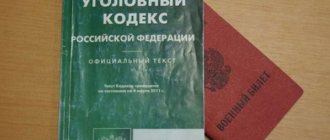Commentary to Art. 333 of the Criminal Code of the Russian Federation
The main object of the crime is the established order of subordination and military statutory relationships. An additional subject is human health.
The objective side consists of committing one of the following actions or a combination of them:
- resistance to a superior, as well as to another person performing the duties of military service assigned to him, involving violence or the threat of its use;
- coercion of a superior, as well as another person performing the duties of military service assigned to him, to violate these duties, associated with violence or the threat of its use.
A superior is a person (senior in position or rank) who has the right to give orders to a subordinate and demand their execution.
Persons performing the duties of military service assigned to them include military personnel who are not superiors in relation to the perpetrator, but are in the performance of military service duties, for example, persons performing the duties of a sentry, patrolman, etc.
The objective side of a crime can only be accomplished through action—resistance. Resistance consists of opposing the boss or other person specified in the law in the performance of his duties, which makes this performance difficult or impossible. Resistance is an active action involving violence or the threat of its use. It is openly demonstrative.
Thus, in one of the cases, it was recognized as resistance that M., being dissatisfied with the official demands of the duty officer, Lieutenant Commander L., caused by the use of alcoholic beverages, M. spoke obscenely at him and punched him in the face on the territory of the farmstead parts .
———————————
Determination of the Supreme Court of the Russian Federation of February 3, 2004 N 5-02/03.
The implied purpose of the act provided for in Art. 333 of the Criminal Code of the Russian Federation recognizes the desire to disobey the lawful orders of a superior or other person performing military service duties, to prevent him from performing official functions (resistance) or to force him to violate his duties (coercion).
If there is resistance, the perpetrator himself, by his actions, does not allow the boss or another person to fulfill his official duties in this particular situation.
Committing a crime in the form of resistance is possible only during the performance of military service duties by a superior or other person. Resistance at other times does not form part of the crime in question. Resistance to illegal actions of a superior does not constitute a crime.
In cases where resistance is associated with failure to comply with an order, the actions of the perpetrator are subject to qualification based on a set of crimes.
Coercion to violate the duties of military service consists of actions the purpose of which is to change the behavior of the superior, force him to carry out the will of the perpetrator and thereby violate the duties assigned to the superior, for example, forcing the superior to grant unauthorized dismissal, leave, exemption from performing any work, etc. P. To have the element of coercion, as well as to have the element of resistance, it is necessary that the actions of the perpetrator involve the use of violence or the threat of its use. However, unlike the composition of resistance, coercion has a different direction of action - not to oppose the performance of his duties by the boss, but to force him to perform the actions desired by the guilty person, to force him to act in the interests of the guilty person or contrary to the interests of the service. At the same time, coercion is always characterized by the presentation of a specific requirement to perform or not perform certain actions.
Thus, the preliminary investigation authorities accused Private A. of making an unlawful demand in the barracks - to remove garbage - to Sergeant P., who was his superior, after which he kicked him once in the left side, causing slight harm to the victim’s health. The garrison military court convicted A. of violent actions against his superior on the basis of Part 1 of Art. 334 of the Criminal Code of the Russian Federation.
It seems that such a qualification cannot be considered correct according to the general norm. In this case, the perpetrators were presented with a specific violent demand from the boss to perform a specific action - remove the garbage. This requirement, as an encroachment on the order of subordination, clearly contradicted the interests of the service, and the violence used by the perpetrators was aimed precisely at achieving this goal. Therefore, what A. did constituted a special element of forcing a superior to violate the duties of military service and required qualification under Part 1 of Art. 333 of the Criminal Code of the Russian Federation.
Coercion may be committed not during the period when the chief is performing his military service duties, but also at another period in anticipation of fulfilling the demands of the perpetrator in the future.
In relation to violence, the law refers to the direct use of violence or the threat of its use. The threat of violence is a mental influence on a person, and its content must indicate the use of physical violence of any degree. Therefore, for example, the threat of destruction of property, dissemination of defamatory information, etc. does not form part of the crime in question. The method of bringing the threat to the attention of the victim does not affect the qualification of the act.
The amount of violence actually used is not specified in the law. However, in this case, the concept of violence covers violence that is not dangerous to life or health: beatings, minor harm to health. Does not require additional qualifications and does not cause harm to health of moderate severity. Causing grievous bodily harm and murder are not covered by the crime in question.
Considering the question of the existence of a crime under Art. 333 of the Criminal Code of the Russian Federation (as well as Art. Art. 334 - 336 of the Criminal Code of the Russian Federation), attention should be paid to the fact that physical violence of one serviceman over another can be recognized as a military crime only if it infringes on the established procedure for military service and applied: a) in connection with the performance of military service duties by the victim, or b) during the performance of at least one of them these duties, or c) when the use of violence, although not directly related to the performance of military service duties, was associated with obvious guilty of violating the order of military relations and expressed clear disrespect for the military collective.
The presence of these signs - during the performance or in connection with the performance of military service duties by the victim - is one of the criteria for delimiting crimes of this category from ordinary crimes.
Characterizing the content of these characteristics, in practice, in some cases, the performance of military service duties in a criminal legal context is understood as the entire time a serviceman is on the territory of a military unit during the service time established by the daily routine. In this case, reference is made to the provisions of sub-clause. "e" clause 1 art. 37 of the Federal Law “On Military Duty and Military Service” and Art. 8 of the Charter of the Internal Service of the Armed Forces of the Russian Federation.
However, such a point of view cannot be considered correct. The purpose of providing in the Law a list of circumstances under which a person is considered to be performing military service duties is to confirm in certain situations his legal status as a military serviceman, to determine the responsibilities assigned to him and the benefits and advantages provided in connection with this Law.
In criminal law, the term “performance of military service duties” already, and unlike military-administrative legislation, carries a different meaning. This term defines the time and content of violations committed by a person as grounds for criminal prosecution.
Therefore, theory and judicial practice have developed a different interpretation of this concept, the essence of which is the actual performance by a military personnel of specific official duties (general or special) assigned to him by law, military regulations or orders of commanders (superiors).
The structure of the objective side is formal. Resistance and coercion will end from the moment of use of violence or from the moment of the threat of its use. The existence of a crime is not affected by whether the perpetrator achieved his goal of interfering with the performance of duties or forcing a superior or other person performing military service duties to violate these duties.
If the boss complied with the will of the perpetrator and committed the required actions that constitute a crime, the actions of the coercer are qualified as a set of crimes under Art. 333 of the Criminal Code of the Russian Federation as the actions of the perpetrator and under the corresponding article of the Special Part of the Criminal Code of the Russian Federation as the actions of an instigator to commit a crime.
The issue of qualification of the boss’s actions in this case is decided taking into account the provisions of Art. 40 of the Criminal Code of the Russian Federation.
The subjective side of the crime is characterized only by direct intent. The perpetrator is aware that he is resisting the boss or forcing him to perform certain actions, and wants to perform these actions.
The subject of the crime is a special one - a military serviceman.
Part 2 of Art. 333 of the Criminal Code of the Russian Federation establishes liability for the same act committed in the presence of the following qualifying criteria:
a) by a group of persons, a group of persons by prior conspiracy or an organized group;
b) using weapons;
c) causing grave or moderate harm to health or other grave consequences.
The concepts of a group of persons, a group of persons by prior conspiracy or an organized group are given in Art. 35 of the Criminal Code of the Russian Federation (see also commentary to Article 332 of the Criminal Code of the Russian Federation).
The use of a weapon means its actual use for its intended purpose, i.e. to hit a living or other target, as well as a demonstration of weapons or a threat to them. The concept of weapons is given in the Federal Law “On Weapons”.
In judicial practice, there is an approach to the issue of the use of weapons, according to which this concept includes the use only of the combat properties of weapons specified in Art. 1 of the Federal Law of December 13, 1996 N 150-FZ “On Weapons”, according to which military hand-held firearms, which, for example, is the AK-74 assault rifle, are intended for mechanical destruction of a target at a distance with a projectile that receives directional movement due to energy of a powder or other charge. Therefore, from this point of view, actions in which these damaging properties of the weapon were not used (for example, a blow with the butt of a machine gun) cannot be regarded as the use of a weapon.
Meanwhile, such a conclusion contradicts both the theory of qualification of military crimes using weapons and judicial practice in cases of crimes against military service, since it is based on the concept of firearms given in the Federal Law “On Weapons”, and not on the concept of “use of weapons "in the criminal legal sense. The use of weapons in crimes against military service should mean not only hitting a target as a result of a shot, but also the use of weapons for psychological influence by threatening to cause death or bodily harm to the victim, as well as the use for this purpose of all the damaging properties of weapons, including bayonets and butt
———————————
See also: paragraph 2 of the Resolution of the Plenum of the Supreme Court of the Russian Federation of November 15, 2007 N 45 “On judicial practice in criminal cases of hooliganism and other crimes committed with hooligan motives”, where using weapons or objects used as weapons , it is proposed to understand deliberate actions aimed at the use by a person of these objects for both physical and mental impact on the victim, as well as other actions indicating an intention to use violence through these weapons or objects used as weapons // Bulletin of the Supreme Court of the Russian Federation . 2008. N 1.
Clause “c” of Part 2 of Art. 333 of the Criminal Code of the Russian Federation fully covers an act that entailed harm to health of moderate severity, as well as serious harm to health without aggravating circumstances. If such circumstances exist, the act requires additional qualification under the relevant part of Art. 111 of the Criminal Code of the Russian Federation.
Moderate harm to health during resistance can be caused either intentionally or through negligence. Causing such harm in any case is covered by clause “c” of Part 2 of Art. 333 of the Criminal Code of the Russian Federation, and additional qualifications under articles on crimes against health are not required.
Causing serious harm to health through negligence or intentionally, but, as noted, in the absence of qualifying signs of Art. 111 of the Criminal Code of the Russian Federation, should also be qualified under paragraph “c” of Part 2 of Art. 333 of the Criminal Code of the Russian Federation without additional reference to Art. 111 of the Criminal Code of the Russian Federation.
The corpus delicti provided for in Art. 333 of the Criminal Code of the Russian Federation does not cover causing death through resistance or coercion by a superior or other person performing the duties of military service assigned to him. Such an act should be qualified under paragraph “b” of Part 2 of Art. 105 of the Criminal Code of the Russian Federation.
Other grave consequences relate to evaluative concepts. In this case, they are determined taking into account the nature, volume, and significance of the consequences. In this regard, these may include, for example, causing major material damage, disabling military equipment, illness of military personnel, suicide of a person who was forced to violate duties, causing death by negligence to a superior, etc.
The corpus delicti provided for in paragraph “c” of Part 2 of Art. 333 of the Criminal Code of the Russian Federation, is material and will be completed from the moment the socially dangerous consequences occur. The subjective side, depending on the attitude to the consequences, can be characterized by direct or indirect intent, as well as two forms of guilt.
Large and particularly large scale crime
According to Part 6 of Article 159 of the Criminal Code of the Russian Federation, fraud on a large scale is the illegal receipt of more than 250,000 rubles due to deception or misleading of the victim. As a rule, large-scale fraud is dismissed in the following areas:
- insurance;
- computer activities;
- entrepreneurship;
- issuing loans;
- manipulation of payment bank cards.
In case of prolonged deception of the victim and systematic misappropriation of sums of money due to non-fulfillment of the terms of the contract, large-scale fraud is considered, in which the amount of damage exceeds 3 million rubles.
- Important! During the trial of a fraud case, judges often classify as major fraud only cases in which the victim has lost more than 1.5 million rubles.
Fraud on an especially large scale includes cases where property or funds in the amount of more than a million rubles are taken from the victim. Most often, fraud committed in the following areas of activity is characterized by a particularly large scale:
- property fraud;
- alternative health services;
- pseudoscientific research;
- Internet;
- real estate trade;
- issuing loans.
The limit at which a crime falls under Part 7 of Article 159 of the Criminal Code of the Russian Federation depends on the composition of the crime and the method of taking property:
- 1 million or more rubles for entrepreneurs who have entered into an agreement with the victim and are unwilling to comply with the terms of the joint agreement.
- 1 million or more rubles for unclassified economic crimes.
- Over 6 million rubles in scams in the areas of lending, insurance, subsidies and the use of bank payment cards.
- More than 12 million rubles for failure to fulfill the contract.
What is the punishment?
The penalties for large-scale fraud, depending on the circumstances, are:
- Monetary penalty in the amount of 100,000 to 500,000 rubles.
- Salary deduction for a period of 1 to 3 years.
- Withholding part of the income while working in the colony.
- Imprisonment for up to 6 years with the possibility of additional measures.
Additional penalties include:
- collecting from the criminal up to 80,000 rubles or withholding wages for six months of work;
- the need to undergo surveillance by law enforcement agencies for one and a half years.
If a crime is classified under Article 159 Part 7, the attacker faces more severe sanctions, including:
- collection of funds in the amount of up to 1 million rubles;
- up to 10 years in prison;
- up to 5 years of work within the walls of a correctional institution, followed by supervision in law enforcement agencies for 2 years.
Judicial practice under Article 333 of the Criminal Code of the Russian Federation
Appeal ruling of the Judicial Collegium for Criminal Cases of the Supreme Court of the Russian Federation dated April 16, 2019 N 49-APU19-8SP
In accordance with the provisions provided for in Part 1 of Art. 333 of the Code of Criminal Procedure of the Russian Federation, jurors, including reserve ones, have the right to participate in the investigation of all the circumstances of the criminal case, ask questions to the interrogated persons through the presiding judge, and other things, in addition, in accordance with paragraph 2 of part 2 of this article, jurors do not have the right to express their opinion on the criminal case under consideration before discussing issues when rendering a verdict. That is, based on the provisions of this article, the possibility of jurors exercising their rights is entrusted to the presiding judge, as well as the issues of removing a juror from further participation in the consideration of a criminal case, in case of violation of the requirements provided for in Part 2 of this article (Part 4 of Art. 333 of the Criminal Code of the Russian Federation).
Aggravating and mitigating circumstances
Criminals have the right to receive a reduced sentence:
- underage;
- pregnant women;
- who are fathers or mothers of young children;
- those who committed a crime due to difficult life circumstances;
- committing an offense under duress;
- provoked by the victim;
- those who filed a confession and provided all possible assistance to the investigation;
- providing assistance to the victim.
Note! In some cases, the repentance of criminals allows them to completely avoid punishment for petty fraud. This opportunity is available only to attackers who have committed a crime of up to moderate severity.
During the court hearing, the public prosecutor has the right to demand an increase in the term or amount of the fine in the presence of the following circumstances:
- relapse;
- the presence of serious consequences that resulted from fraud;
- committing a crime in a group;
- increased activity during the commission of an offense;
- involvement of incapacitated or minor citizens in crime;
- the presence of specific motives;
- the victim was in the performance of his duty at the time of the fraud;
- the victim is a pregnant woman or a defenseless person;
- the use of measures of extreme cruelty during the commission of an atrocity;
- use of official position;
- use of government identification;
- the crime was committed by a person who is the parent of a minor teenager.
In summary: what are the types of fraud and the penalties for it?
The criminal legislation of the Russian Federation divides fraud into 7 large groups. Each variant of the crime is described in the relevant part of Article 159 of the Criminal Code of the Russian Federation. The size of the punishment for committing a crime depends on the scale of fraudulent actions, the number of criminals and the fact of use of official position.
Previous
Automobile lawWhat are the terms for deprivation of a driver's license and what are the terms for their return
Next
NEWSWhat is the penalty for disclosing trade secrets?
Note! If you have any questions, you can chat for free with our lawyer at the bottom of the screen or call the HOTLINE. Free call for all of Russia.







